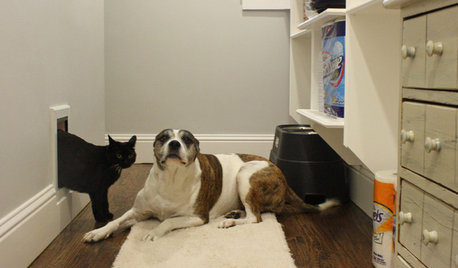Detection of herbicides in the urine of pet dogs following home l
henry_kuska
10 years ago
Related Stories

HOME TECHTo Feed and Protect: Care for Your Pet From Afar With New Devices
You might miss the nuzzles, but your dog or cat won't miss food, water or monitoring with these high-tech feeders and cameras
Full Story
PETS6 Ways to Help Your Dog and Landscape Play Nicely Together
Keep your prized plantings intact and your dog happy too, with this wisdom from an expert gardener and dog guardian
Full Story
PETSPet-Proofing Your Home: A Room-by-Room Guide
Not all pet dangers are obvious. Keep furry friends safe and sound by handling all of these potential hazards
Full Story
PETSHouzz Call: Send in the Design Cats
Post your best photo of your cat at home, in the garden or with you in your studio. It could be published in a featured ideabook
Full Story
THE HARDWORKING HOMEA Laundry Makes Room for a Diva Cat
A South Carolina laundry room was designed to be sophisticated and functional, but when a kitten arrived, whimsy emerged
Full Story
MONTHLY HOME CHECKLISTSYour Checklist for Quick Houseguest Prep
Follow these steps to get your home ready in a hurry for overnight visitors
Full Story
PETSHouzz TV: Watch These Rescued Cats Make a House Their Playland
Spirals, catwalks, tunnels and platforms create a superhighway inside this home in Southern California
Full Story
HOUSEKEEPINGWhat's That Smell? What to Do About Stinky Furniture
Learn how to diagnose and treat pet and other furniture odors — and when to call in a pro
Full Story
HOUZZ TOURSHouzz Tour: New Love and a Fresh Start in a Midcentury Ranch House
A Nashville couple, both interior designers, fall for a neglected 1960 home. Their renovation story has a happy ending
Full Story
LIFEThe Top 5 Ways to Save Water at Home
Get on the fast track to preserving a valuable resource and saving money too with these smart, effective strategies
Full StoryMore Discussions









henry_kuskaOriginal Author
henry_kuskaOriginal Author
Related Professionals
Barrington Hills Landscape Architects & Landscape Designers · Garden City Landscape Architects & Landscape Designers · Kenmore Landscape Architects & Landscape Designers · Manorville Landscape Architects & Landscape Designers · Southfield Landscape Architects & Landscape Designers · Mooresville Landscape Contractors · Westwood Landscape Contractors · Wilmington Landscape Contractors · Ashburn Landscape Contractors · Canby Landscape Contractors · Dallas Landscape Contractors · Mahwah Landscape Contractors · Shaker Heights Landscape Contractors · Woodbury Landscape Contractors · York Landscape ContractorsPoorbutroserich Susan Nashville
minflick
eahamel